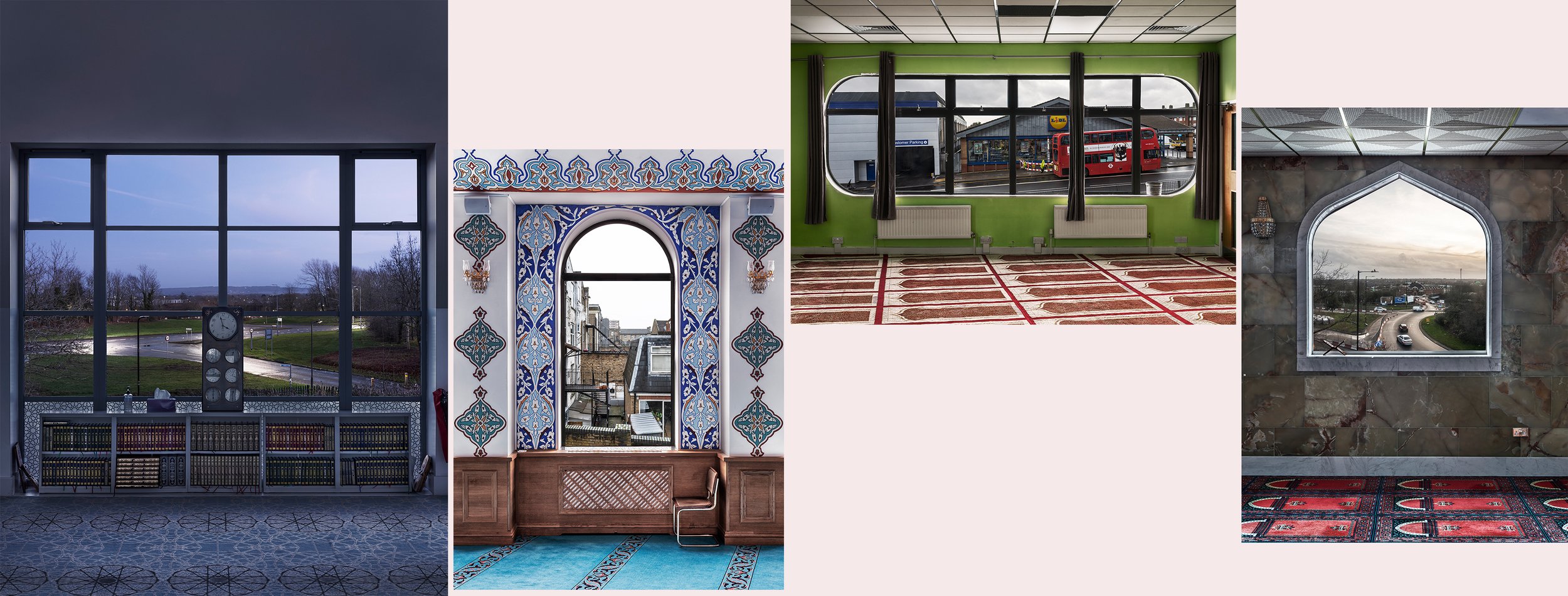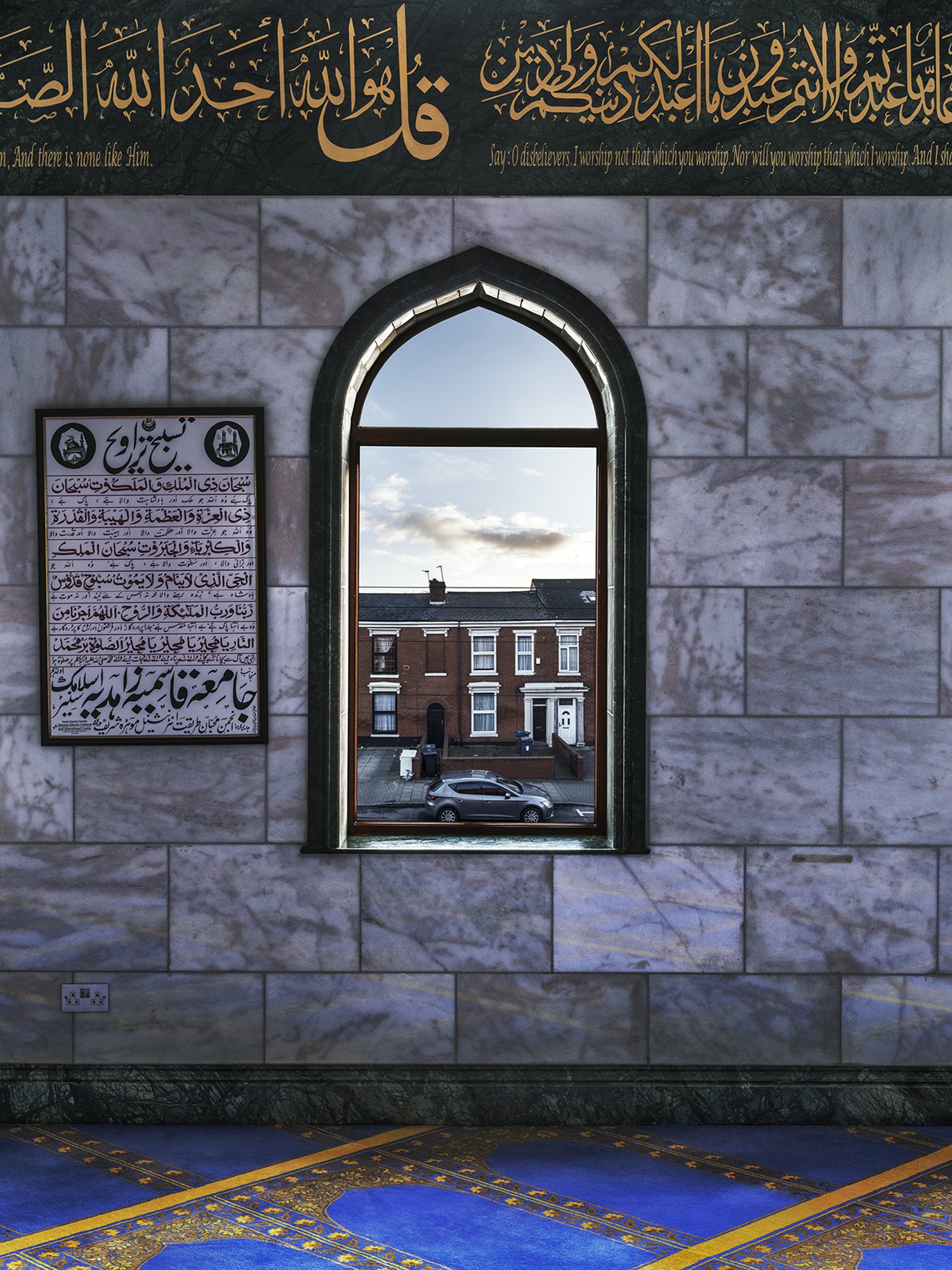Marwan Bassiouni: The Other View
August 25th, 2023
By Louis Barnard @louis.s.barnard
Multicoloured mosques and minarets have bejeweled British landscapes since the late 1800s, and yet, the interiors of these spaces of worship remain almost completely unfamiliar to the non-muslims with whom the landscape is shared. New British Views is Marwan Bassiouni's attempt to correct imbalanced representations of Islam by inverting traditional perspectives of his religion, offering us a different way of seeing altogether.
“Religion changed my way of seeing and, hence, my way of photographing. This happened at a time when I had seen a lot of darkness, it was like light suddenly pouring into a dark room.”
The nomadic nature of the project, which has taken Bassiouni to over 100 mosques across the UK and Europe, is not unfamiliar to a photographer whose sense of identity has never been tied to a particular locale: “I grew up in a way that wasn’t rooted to place, moving between different places and cultures, so I don’t tend to think about my identity in relation to a physical location.”
But despite an ‘untethered’ upbringing, Bassiouni says that he developed a sense of belonging in his faith, which he speaks about with an assuredness that dispels any notions of ‘displacement’: “As a Muslim, I don’t belong to anything except to God, so I’ve always seen the whole world as a home. I think what’s important is to appreciate where we are, to appreciate that we’re in a certain place, at a certain time, for a certain reason”
But Bassiouni’s religious convictions haven't always been so firm, it wasn’t until the age of 24 that he began to take an avid interest in Islam, a spiritual awakening that precipitated a disconnect between his spiritual and artistic self.
Bassiouni explains how he grappled with this separation, describing the experience as ‘schizophrenic’: “As an artist who was looking for a purpose in what they were doing, it was schizophrenic. When you are representing the world, how can you put your beliefs, your faith, and your perspective to one side?”
But the photographer recalls finding inspiration in the writing of the Russian film-maker, Andrei Tarkovsky, who suggested that spirituality is the essence of creativity. Over time, Bassiouni was able to reconcile the two halves of himself and came to allow his religious beliefs to guide his creative process.
One of the more conspicuous ways this manifests in Bassiouni’s post-secular work is the ‘absent presence’ (or, ‘presence of absence’ if you prefer). Referring to the traditional Islamic schools of thought that consider images of animated beings to be detrimental to the soul, Bassiouni says that these teachings accelerated a process of omission that had already been occurring organically within his work: “I naturally came to stop including people in my projects, something interesting was emerging in the images when there was an absence of animated things, a stillness.”
With the absence of life, light has become a key protagonist in Bassiouni’s work, which is perhaps unsurprising given its symbolism in Islam and religious lore more generally. It seeps in through windows and soaks the profane landscapes, saturating them with spiritual meaning.
Bassiouni’s images are shot between dusk and dawn, against cold grey and bright blue skies to communicate light’s transformative powers: “When you’re outside a mosque at sunset there’s a particular feeling, taste, atmosphere; at noon or at sunrise there’s a whole other energy. The subtlety of feeling in the time of day is something I try to translate in my photographs.”
In settings where religious folk gather to communicate with the divine - that which is there, yet not there - the presence both of absence and of light charges the images with spiritual meaning. But despite his religious convictions, Bassiouni insists his images are not meant to proselytise, emphasising his desire to produce photographs that speak for themselves: “The role of the photographer is to be a kind of mediator between the viewer and a subject; to stay back and let the image communicate, not to talk over it. What I’m trying to do is to place the viewer in the landscape, to make you forget that you are looking at a photograph…”
This is another advantage of Bassiouni’s tranquil brand of image-making, allowing the viewer to take agency over their experience. Naturally empathetic beings, we often look to people or animals to tell us how to feel; without these to guide us, we are left to discover Bassiouni’s images on our own, making our own meaning. Bassiouni invites the viewer to step behind the lens and explore each scene for themselves, to absorb the unique atmosphere of each place at a precise moment in time:
“I’m not trying to change how we see things, that’s not what I strive for as a photographer. My goal is to offer a glimpse of a moment, a visual experience that can hopefully make someone stop and think - that offers that authentic moment of presence with yourself, a moment of peace.”
About Marwan Bassiouni
Marwan Bassiouni (b. 1985, Morges, Switzerland) is a photographer and artist living in Amsterdam, the Netherlands.
He began his formal training as a photographer by working as an assistant in a commercial studio in Geneva while following a photography apprenticeship at the Photography School of Vevey. He then worked in the media department of a human rights NGO focused on the Middle East and North Africa. In 2012, Bassiouni traveled to Cairo and produced his first photographic series before pursuing studies at the Royal Academy of Art in the Hague, Netherlands.
Marwan’s images, often presented large scale, lie at an intersection between documentary practice, fine art, and intercultural mediation. In his photographs, he explores the poetics and aesthetics of documentary photography while focusing on the Western landscape and themes related to identity, spirituality, culture, and the politics of representation.










